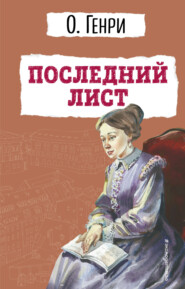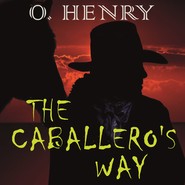По всем вопросам обращайтесь на: info@litportal.ru
(©) 2003-2024.
✖
Rolling Stones
Настройки чтения
Размер шрифта
Высота строк
Поля
"Down along China or Peru – or maybe the Argentine Confederacy," said Kansas Bill. "Anyway 'twas among a great race of people, off-colored but progressive. I was there three months."
"No doubt you are glad to be back among the truly great race," I surmised. "Especially among New Yorkers, the most progressive and independent citizens of any country in the world," I continued, with the fatuity of the provincial who has eaten the Broadway lotus.
"Do you want to start an argument?" asked Bill.
"Can there be one?" I answered.
"Has an Irishman humor, do you think?" asked he.
"I have an hour or two to spare," said I, looking at the café clock.
"Not that the Americans aren't a great commercial nation," conceded Bill. "But the fault laid with the people who wrote lies for fiction."
"What was this Irishman's name?" I asked.
"Was that last beer cold enough?" said he.
"I see there is talk of further outbreaks among the Russian peasants," I remarked.
"His name was Barney O'Connor," said Bill.
Thus, because of our ancient prescience of each other's trail of thought, we travelled ambiguously to the point where Kansas Bill's story began:
"I met O'Connor in a boarding-house on the West Side. He invited me to his hall-room to have a drink, and we became like a dog and a cat that had been raised together. There he sat, a tall, fine, handsome man, with his feet against one wall and his back against the other, looking over a map. On the bed and sticking three feet out of it was a beautiful gold sword with tassels on it and rhinestones in the handle.
"'What's this?' says I (for by that time we were well acquainted). 'The annual parade in vilification of the ex-snakes of Ireland? And what's the line of march? Up Broadway to Forty-second; thence east to McCarty's café; thence – '
"'Sit down on the wash-stand,' says O'Connor, 'and listen. And cast no perversions on the sword. 'Twas me father's in old Munster. And this map, Bowers, is no diagram of a holiday procession. If ye look again. ye'll see that it's the continent known as South America, comprising fourteen green, blue, red, and yellow countries, all crying out from time to time to be liberated from the yoke of the oppressor.'
"'I know,' says I to O'Connor. 'The idea is a literary one. The ten-cent magazine stole it from "Ridpath's History of the World from the Sand-stone Period to the Equator." You'll find it in every one of 'em. It's a continued story of a soldier of fortune, generally named O'Keefe, who gets to be dictator while the Spanish-American populace cries "Cospetto!" and other Italian maledictions. I misdoubt if it's ever been done. You're not thinking of trying that, are you, Barney?' I asks.
"'Bowers,' says he, 'you're a man of education and courage.'
"'How can I deny it?' says I. 'Education runs in my family; and I have acquired courage by a hard struggle with life.'
"'The O'Connors,' says he, 'are a warlike race. There is me father's sword; and here is the map. A life of inaction is not for me. The O'Connors were born to rule. 'Tis a ruler of men I must be.'
"'Barney,' I says to him, 'why don't you get on the force and settle down to a quiet life of carnage and corruption instead of roaming off to foreign parts? In what better way can you indulge your desire to subdue and maltreat the oppressed?'
"'Look again at the map,' says he, 'at the country I have the point of me knife on. 'Tis that one I have selected to aid and overthrow with me father's sword.'
"'I see,' says I. 'It's the green one; and that does credit to your patriotism, and it's the smallest one; and that does credit to your judgment.'
"'Do ye accuse me of cowardice?' says Barney, turning pink.
"'No man,' says I, 'who attacks and confiscates a country single-handed could be called a coward. The worst you can be charged with is plagiarism or imitation. If Anthony Hope and Roosevelt let you get away with it, nobody else will have any right to kick.'
"'I'm not joking,' says O'Connor. 'And I've got $1,500 cash to work the scheme with. I've taken a liking to you. Do you want it, or not?'
"'I'm not working,' I told him; 'but how is it to be? Do I eat during the fomentation of the insurrection, or am I only to be Secretary of War after the country is conquered? Is it to be a pay envelope or only a portfolio?'
"I'll pay all expenses,' says O'Connor. 'I want a man I can trust. If we succeed you may pick out any appointment you want in the gift of the government.'
"'All right, then,' says I. 'You can get me a bunch of draying contracts and then a quick-action consignment to a seat on the Supreme Court bench so I won't be in line for the presidency. The kind of cannon they chasten their presidents with in that country hurt too much. You can consider me on the pay-roll.'
"Two weeks afterward O'Connor and me took a steamer for the small, green, doomed country. We were three weeks on the trip. O'Connor said he had his plans all figured out in advance; but being the commanding general, it consorted with his dignity to keep the details concealed from his army and cabinet, commonly known as William T. Bowers. Three dollars a day was the price for which I joined the cause of liberating an undiscovered country from the ills that threatened or sustained it. Every Saturday night on the steamer I stood in line at parade rest, and O'Connor handed ever the twenty-one dollars.
"The town we landed at was named Guayaquerita, so they told me. 'Not for me,' says I. 'It'll be little old Hilldale or Tompkinsville or Cherry Tree Corners when I speak of it. It's a clear case where Spelling Reform ought to butt in and disenvowel it.'
"But the town looked fine from the bay when we sailed in. It was white, with green ruching, and lace ruffles on the skirt when the surf slashed up on the sand. It looked as tropical and dolce far ultra as the pictures of Lake Ronkonkoma in the brochure of the passenger department of the Long Island Railroad.
"We went through the quarantine and custom-house indignities; and then O'Connor leads me to a 'dobe house on a street called 'The Avenue of the Dolorous Butterflies of the Individual and Collective Saints.' Ten feet wide it was, and knee-deep in alfalfa and cigar stumps.
"'Hooligan Alley,' says I, rechristening it.
"''Twill be our headquarters,' says O'Connor. 'My agent here, Don Fernando Pacheco, secured it for us.'
"So in that house O'Connor and me established the revolutionary centre. In the front room we had ostensible things such as fruit, a guitar, and a table with a conch shell on it. In the back room O'Connor had his desk and a large looking-glass and his sword hid in a roll of straw matting. We slept on hammocks that we hung to hooks in the wall; and took our meals at the Hotel Ingles, a beanery run on the American plan by a German proprietor with Chinese cooking served à la Kansas City lunch counter.
"It seems that O'Connor really did have some sort of system planned out beforehand. He wrote plenty of letters; and every day or two some native gent would stroll round to headquarters and be shut up in the back room for half an hour with O'Connor and the interpreter. I noticed that when they went in they were always smoking eight-inch cigars and at peace with the world; but when they came out they would be folding up a ten- or twenty-dollar bill and cursing the government horribly.
"One evening after we had been in Guaya – in this town of Smellville-by-the-Sea – about a month, and me and O'Connor were sitting outside the door helping along old tempus fugit with rum and ice and limes, I says to him:
"'If you'll excuse a patriot that don't exactly know what he's patronizing, for the question – what is your scheme for subjugating this country? Do you intend to plunge it into bloodshed, or do you mean to buy its votes peacefully and honorably at the polls?'
"'Bowers,' says he, 'ye're a fine little man and I intend to make great use of ye after the conflict. But ye do not understand statecraft. Already by now we have a network of strategy clutching with invisible fingers at the throat of the tyrant Calderas. We have agents at work in every town in the republic. The Liberal party is bound to win. On our secret lists we have the names of enough sympathizers to crush the administration forces at a single blow.'
"'A straw vote,' says I, 'only shows which way the hot air blows.'
"'Who has accomplished this?' goes on O'Connor. 'I have. I have directed everything. The time was ripe when we came, so my agents inform me. The people are groaning under burdens of taxes and levies. Who will be their natural leader when they rise? Could it be any one but meself? 'Twas only yesterday that Zaldas, our representative in the province of Durasnas, tells me that the people, in secret, already call me "El Library Door," which is the Spanish manner of saying "The Liberator."'
"'Was Zaldas that maroon-colored old Aztec with a paper collar on and unbleached domestic shoes?' I asked.
"'He was,' says O'Connor.
"'I saw him tucking a yellow-back into his vest pocket as he came out,' says I. 'It may be,' says I, 'that they call you a library door, but they treat you more like the side door of a bank. But let us hope for the worst.'
"'It has cost money, of course,' says O'Connor; 'but we'll have the country in our hands inside of a month.'
"In the evenings we walked about in the plaza and listened to the band playing and mingled with the populace at its distressing and obnoxious pleasures. There were thirteen vehicles belonging to the upper classes, mostly rockaways and old-style barouches, such as the mayor rides in at the unveiling of the new poorhouse at Milledgeville, Alabama. Round and round the desiccated fountain in the middle of the plaza they drove, and lifted their high silk hats to their friends. The common people walked around in barefooted bunches, puffing stogies that a Pittsburg millionaire wouldn't have chewed for a dry smoke on Ladies' Day at his club. And the grandest figure in the whole turnout was Barney O'Connor. Six foot two he stood in his Fifth Avenue clothes, with his eagle eye and his black moustache that tickled his ears. He was a born dictator and czar and hero and harrier of the human race. It looked to me that all eyes were turned upon O'Connor, and that every woman there loved him, and every man feared him. Once or twice I looked at him and thought of funnier things that had happened than his winning out in his game; and I began to feel like a Hidalgo de Officio de Grafto de South America myself. And then I would come down again to solid bottom and let my imagination gloat, as usual, upon the twenty-one American dollars due me on Saturday night.
"'Take note,' says O'Connor to me as thus we walked, 'of the mass of the people. Observe their oppressed and melancholy air. Can ye not see that they are ripe for revolt? Do ye not perceive that they are disaffected?'
"'I do not,' says I. 'Nor disinfected either. I'm beginning to understand these people. When they look unhappy they're enjoying themselves. When they feel unhappy they go to sleep. They're not the kind of people to take an interest in revolutions.'
"'They'll flock to our standard,' says O'Connor. 'Three thousand men in this town alone will spring to arms when the signal is given. I am assured of that. But everything is in secret. There is no chance for us to fail.'
"On Hooligan Alley, as I prefer to call the street our headquarters was on, there was a row of flat 'dobe houses with red tile roofs, some straw shacks full of Indians and dogs, and one two-story wooden house with balconies a little farther down. That was where General Tumbalo, the comandante and commander of the military forces, lived. Right across the street was a private residence built like a combination bake-oven and folding-bed. One day, O'Connor and me were passing it, single file, on the flange they called a sidewalk, when out of the window flies a big red rose. O'Connor, who is ahead, picks it up, presses it to his fifth rib, and bows to the ground. By Carrambos! that man certainly had the Irish drama chaunceyized. I looked around expecting to see the little boy and girl in white sateen ready to jump on his shoulder while he jolted their spinal columns and ribs together through a breakdown, and sang: 'Sleep, Little One, Sleep.'
"No doubt you are glad to be back among the truly great race," I surmised. "Especially among New Yorkers, the most progressive and independent citizens of any country in the world," I continued, with the fatuity of the provincial who has eaten the Broadway lotus.
"Do you want to start an argument?" asked Bill.
"Can there be one?" I answered.
"Has an Irishman humor, do you think?" asked he.
"I have an hour or two to spare," said I, looking at the café clock.
"Not that the Americans aren't a great commercial nation," conceded Bill. "But the fault laid with the people who wrote lies for fiction."
"What was this Irishman's name?" I asked.
"Was that last beer cold enough?" said he.
"I see there is talk of further outbreaks among the Russian peasants," I remarked.
"His name was Barney O'Connor," said Bill.
Thus, because of our ancient prescience of each other's trail of thought, we travelled ambiguously to the point where Kansas Bill's story began:
"I met O'Connor in a boarding-house on the West Side. He invited me to his hall-room to have a drink, and we became like a dog and a cat that had been raised together. There he sat, a tall, fine, handsome man, with his feet against one wall and his back against the other, looking over a map. On the bed and sticking three feet out of it was a beautiful gold sword with tassels on it and rhinestones in the handle.
"'What's this?' says I (for by that time we were well acquainted). 'The annual parade in vilification of the ex-snakes of Ireland? And what's the line of march? Up Broadway to Forty-second; thence east to McCarty's café; thence – '
"'Sit down on the wash-stand,' says O'Connor, 'and listen. And cast no perversions on the sword. 'Twas me father's in old Munster. And this map, Bowers, is no diagram of a holiday procession. If ye look again. ye'll see that it's the continent known as South America, comprising fourteen green, blue, red, and yellow countries, all crying out from time to time to be liberated from the yoke of the oppressor.'
"'I know,' says I to O'Connor. 'The idea is a literary one. The ten-cent magazine stole it from "Ridpath's History of the World from the Sand-stone Period to the Equator." You'll find it in every one of 'em. It's a continued story of a soldier of fortune, generally named O'Keefe, who gets to be dictator while the Spanish-American populace cries "Cospetto!" and other Italian maledictions. I misdoubt if it's ever been done. You're not thinking of trying that, are you, Barney?' I asks.
"'Bowers,' says he, 'you're a man of education and courage.'
"'How can I deny it?' says I. 'Education runs in my family; and I have acquired courage by a hard struggle with life.'
"'The O'Connors,' says he, 'are a warlike race. There is me father's sword; and here is the map. A life of inaction is not for me. The O'Connors were born to rule. 'Tis a ruler of men I must be.'
"'Barney,' I says to him, 'why don't you get on the force and settle down to a quiet life of carnage and corruption instead of roaming off to foreign parts? In what better way can you indulge your desire to subdue and maltreat the oppressed?'
"'Look again at the map,' says he, 'at the country I have the point of me knife on. 'Tis that one I have selected to aid and overthrow with me father's sword.'
"'I see,' says I. 'It's the green one; and that does credit to your patriotism, and it's the smallest one; and that does credit to your judgment.'
"'Do ye accuse me of cowardice?' says Barney, turning pink.
"'No man,' says I, 'who attacks and confiscates a country single-handed could be called a coward. The worst you can be charged with is plagiarism or imitation. If Anthony Hope and Roosevelt let you get away with it, nobody else will have any right to kick.'
"'I'm not joking,' says O'Connor. 'And I've got $1,500 cash to work the scheme with. I've taken a liking to you. Do you want it, or not?'
"'I'm not working,' I told him; 'but how is it to be? Do I eat during the fomentation of the insurrection, or am I only to be Secretary of War after the country is conquered? Is it to be a pay envelope or only a portfolio?'
"I'll pay all expenses,' says O'Connor. 'I want a man I can trust. If we succeed you may pick out any appointment you want in the gift of the government.'
"'All right, then,' says I. 'You can get me a bunch of draying contracts and then a quick-action consignment to a seat on the Supreme Court bench so I won't be in line for the presidency. The kind of cannon they chasten their presidents with in that country hurt too much. You can consider me on the pay-roll.'
"Two weeks afterward O'Connor and me took a steamer for the small, green, doomed country. We were three weeks on the trip. O'Connor said he had his plans all figured out in advance; but being the commanding general, it consorted with his dignity to keep the details concealed from his army and cabinet, commonly known as William T. Bowers. Three dollars a day was the price for which I joined the cause of liberating an undiscovered country from the ills that threatened or sustained it. Every Saturday night on the steamer I stood in line at parade rest, and O'Connor handed ever the twenty-one dollars.
"The town we landed at was named Guayaquerita, so they told me. 'Not for me,' says I. 'It'll be little old Hilldale or Tompkinsville or Cherry Tree Corners when I speak of it. It's a clear case where Spelling Reform ought to butt in and disenvowel it.'
"But the town looked fine from the bay when we sailed in. It was white, with green ruching, and lace ruffles on the skirt when the surf slashed up on the sand. It looked as tropical and dolce far ultra as the pictures of Lake Ronkonkoma in the brochure of the passenger department of the Long Island Railroad.
"We went through the quarantine and custom-house indignities; and then O'Connor leads me to a 'dobe house on a street called 'The Avenue of the Dolorous Butterflies of the Individual and Collective Saints.' Ten feet wide it was, and knee-deep in alfalfa and cigar stumps.
"'Hooligan Alley,' says I, rechristening it.
"''Twill be our headquarters,' says O'Connor. 'My agent here, Don Fernando Pacheco, secured it for us.'
"So in that house O'Connor and me established the revolutionary centre. In the front room we had ostensible things such as fruit, a guitar, and a table with a conch shell on it. In the back room O'Connor had his desk and a large looking-glass and his sword hid in a roll of straw matting. We slept on hammocks that we hung to hooks in the wall; and took our meals at the Hotel Ingles, a beanery run on the American plan by a German proprietor with Chinese cooking served à la Kansas City lunch counter.
"It seems that O'Connor really did have some sort of system planned out beforehand. He wrote plenty of letters; and every day or two some native gent would stroll round to headquarters and be shut up in the back room for half an hour with O'Connor and the interpreter. I noticed that when they went in they were always smoking eight-inch cigars and at peace with the world; but when they came out they would be folding up a ten- or twenty-dollar bill and cursing the government horribly.
"One evening after we had been in Guaya – in this town of Smellville-by-the-Sea – about a month, and me and O'Connor were sitting outside the door helping along old tempus fugit with rum and ice and limes, I says to him:
"'If you'll excuse a patriot that don't exactly know what he's patronizing, for the question – what is your scheme for subjugating this country? Do you intend to plunge it into bloodshed, or do you mean to buy its votes peacefully and honorably at the polls?'
"'Bowers,' says he, 'ye're a fine little man and I intend to make great use of ye after the conflict. But ye do not understand statecraft. Already by now we have a network of strategy clutching with invisible fingers at the throat of the tyrant Calderas. We have agents at work in every town in the republic. The Liberal party is bound to win. On our secret lists we have the names of enough sympathizers to crush the administration forces at a single blow.'
"'A straw vote,' says I, 'only shows which way the hot air blows.'
"'Who has accomplished this?' goes on O'Connor. 'I have. I have directed everything. The time was ripe when we came, so my agents inform me. The people are groaning under burdens of taxes and levies. Who will be their natural leader when they rise? Could it be any one but meself? 'Twas only yesterday that Zaldas, our representative in the province of Durasnas, tells me that the people, in secret, already call me "El Library Door," which is the Spanish manner of saying "The Liberator."'
"'Was Zaldas that maroon-colored old Aztec with a paper collar on and unbleached domestic shoes?' I asked.
"'He was,' says O'Connor.
"'I saw him tucking a yellow-back into his vest pocket as he came out,' says I. 'It may be,' says I, 'that they call you a library door, but they treat you more like the side door of a bank. But let us hope for the worst.'
"'It has cost money, of course,' says O'Connor; 'but we'll have the country in our hands inside of a month.'
"In the evenings we walked about in the plaza and listened to the band playing and mingled with the populace at its distressing and obnoxious pleasures. There were thirteen vehicles belonging to the upper classes, mostly rockaways and old-style barouches, such as the mayor rides in at the unveiling of the new poorhouse at Milledgeville, Alabama. Round and round the desiccated fountain in the middle of the plaza they drove, and lifted their high silk hats to their friends. The common people walked around in barefooted bunches, puffing stogies that a Pittsburg millionaire wouldn't have chewed for a dry smoke on Ladies' Day at his club. And the grandest figure in the whole turnout was Barney O'Connor. Six foot two he stood in his Fifth Avenue clothes, with his eagle eye and his black moustache that tickled his ears. He was a born dictator and czar and hero and harrier of the human race. It looked to me that all eyes were turned upon O'Connor, and that every woman there loved him, and every man feared him. Once or twice I looked at him and thought of funnier things that had happened than his winning out in his game; and I began to feel like a Hidalgo de Officio de Grafto de South America myself. And then I would come down again to solid bottom and let my imagination gloat, as usual, upon the twenty-one American dollars due me on Saturday night.
"'Take note,' says O'Connor to me as thus we walked, 'of the mass of the people. Observe their oppressed and melancholy air. Can ye not see that they are ripe for revolt? Do ye not perceive that they are disaffected?'
"'I do not,' says I. 'Nor disinfected either. I'm beginning to understand these people. When they look unhappy they're enjoying themselves. When they feel unhappy they go to sleep. They're not the kind of people to take an interest in revolutions.'
"'They'll flock to our standard,' says O'Connor. 'Three thousand men in this town alone will spring to arms when the signal is given. I am assured of that. But everything is in secret. There is no chance for us to fail.'
"On Hooligan Alley, as I prefer to call the street our headquarters was on, there was a row of flat 'dobe houses with red tile roofs, some straw shacks full of Indians and dogs, and one two-story wooden house with balconies a little farther down. That was where General Tumbalo, the comandante and commander of the military forces, lived. Right across the street was a private residence built like a combination bake-oven and folding-bed. One day, O'Connor and me were passing it, single file, on the flange they called a sidewalk, when out of the window flies a big red rose. O'Connor, who is ahead, picks it up, presses it to his fifth rib, and bows to the ground. By Carrambos! that man certainly had the Irish drama chaunceyized. I looked around expecting to see the little boy and girl in white sateen ready to jump on his shoulder while he jolted their spinal columns and ribs together through a breakdown, and sang: 'Sleep, Little One, Sleep.'

















